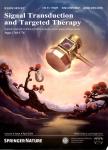The paradox of immunotherapy in NASH-HCC
作者机构:Department of GastroenterologyGuangzhou First Peopled HospitalSouth China University of TechnologyGuangzhouChina Institute of Digestive Disease and Department of Medicine and TherapeuticsState Key Laboratory of Digestive DiseaseLi Ka Shing Institute of Health SciencesCUHK-Shenzhen research InstituteThe Chinese University of Hong KongHong KongChina
出 版 物:《Signal Transduction and Targeted Therapy》 (信号转导与靶向治疗(英文))
年 卷 期:2021年第6卷第7期
页 面:1942-1943页
核心收录:
学科分类:1002[医学-临床医学] 100214[医学-肿瘤学] 10[医学]
基 金:This work was supported by the National Key R&D Program of China(No.2020YFA0509200/2020YFA0509203) RGC-CRF Hong Kong(C4041-17GF C7026-18G) RGC Theme-based Res Scheme Hong Kong(T12-703/19-R)
主 题:PD1 immunotherapy
摘 要:A recent study published in Nature by Dominik Pfister et al.1 unveiled a darker side of immune checkpoint blockade(ICB)immunotherapy in the context of nonalcoholic steatohepatitis-associated hepatocellular carcinoma(NASH-HCC),whereby anti-PD1 treatment paradoxically accelerates hepatocarcinogenesis.



